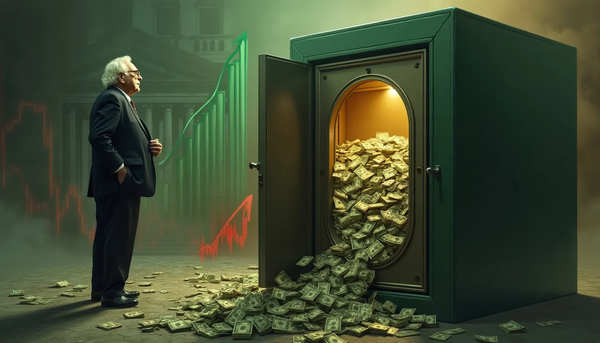Why Warren Buffett is Exiting the Stock Market

Warren Buffett, one of the greatest investors of all time, has decided to liquidate a significant portion of his stock portfolio, converting it into cash. But why is the Oracle of Omaha making this move now? Let’s peel back the layers and find out.
Aug 9, 2024
Warren Buffett, one of the greatest investors of all time, has decided to liquidate a significant portion of his stock portfolio, converting it into cash. But why is the Oracle of Omaha making this move now? Let’s peel back the layers and find out.
A Historic Sell-Off
This past Monday, the Japanese stock market experienced one of its steepest daily declines in history—a bloodbath that also extended, albeit less dramatically, to European and American markets. While these markets have largely recovered since that fateful “Black Monday,” it has been a rough month overall, especially for U.S. stocks. The S&P 500 has dropped 6.7%, and the tech-heavy Nasdaq has plunged 12% over the last 30 days.
Buffett’s Big Move: Selling Apple
Against this backdrop, it’s not surprising that Warren Buffett made headlines for selling a massive portion of his holdings in Apple, reducing his stake from around $135 billion to $84 billion—a sale totaling about $50 billion. But why did Buffett sell so much of his Apple stock? The simple answer: he believed the stock was overpriced.
If you're a major shareholder in a company trading at what you consider to be inflated prices, the logical move is to sell some of your holdings. That’s exactly what Buffett did—he trimmed his position but didn’t exit entirely, suggesting he isn’t completely bearish on Apple.
Holding Cash: A Strategic Move
What’s more interesting is that Buffett didn’t reinvest that $50 billion into other stocks. Instead, he added it to his cash reserves. As of now, Berkshire Hathaway, the conglomerate he leads, holds an astounding $275 billion in cash and cash equivalents—the highest cash position in the company’s history.
But why is Buffett hoarding so much cash? It’s not just sitting in a bank account; a significant portion is invested in short-term U.S. Treasury bills, which currently yield an attractive 4.4% over one year. However, even Buffett knows that these yields are likely to decline as the Federal Reserve reduces interest rates in the coming months.
Buffett’s Long-Term View
So, if short-term Treasuries aren’t the long-term solution, why hold so much cash? Buffett has made it clear that he’s holding cash not because it’s a great investment, but because the alternative—staying heavily invested in an overvalued stock market—seems even worse.
In May 2024, during Berkshire Hathaway’s annual shareholder meeting, Buffett stated, “Given the current market conditions, I’m perfectly comfortable increasing our cash position. When I look at the available options in the stock market and consider what's happening globally, cash looks pretty attractive right now.”
Buffett’s Investment Philosophy
At 93 years old, Buffett is still applying one of his most famous investment principles: “Be fearful when others are greedy, and be greedy when others are fearful.” Judging by the recent performance of the stock market in the third quarter of 2024, it seems he’s once again making the right call.
In summary, Buffett’s historic cash pile suggests that he currently sees few, if any, attractive investment opportunities with a sufficient margin of safety. Whether this strategy will pay off remains to be seen, but if history is any guide, it would be unwise to bet against the Oracle of Omaha.
Stay tuned to The Money Monkey for more updates as this financial drama unfolds. 🍌💼